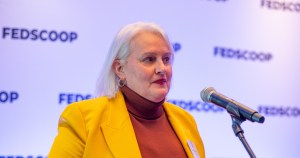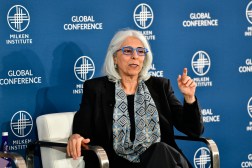How the hiring freeze could impact the federal IT and cybersecurity workforce

One of Donald Trump’s first actions as president was to sign an executive order implementing an across-the-board hiring freeze in federal government.
The specific details of that freeze and its immediate impacts on IT are still being worked out — particularly whether any of those positions might be granted exemptions for national security and public safety purposes. But experts say the freeze and the forthcoming federal workforce attrition plan from the Office of Management and Budget could make the government an unattractive employer in a competitive market for a small pool of talent.
Mallory Barg Bulman, the Partnership for Public Service’s vice president for research and evaluation, told FedScoop there are almost three times more information technology employees in government older than 60 than younger than 30. That trend will likely worsen, she said, as the Trump administration’s policies kick in.
OMB was directed to recommend, within 90 days of the memorandum’s publishing, its own plan for decreasing the size of government through attrition.
“The federal IT workforce, a larger percentage of it is retirement eligible than the general population of the federal government, so if we’re moving toward shrinking the government through attrition it would adversely affect the IT workforce,” Bulman said. “Also, the federal government has a really hard time hiring federal IT talent. And so anything that slows that process down, even I suspect the suggestion of a hiring freeze, slows that down moving forward.”
Rep. Gerry Connolly, D-Va., slammed the decision to initiate the hiring freeze, calling an across-the-board hiring freeze “one of the most mindless approaches to management.”
He told FedScoop the freeze is “the cheap way out, and it doesn’t distinguish between critical missions and noncritical missions.”
Connolly later added: “It makes federal service even less attractive in the current context, and that will make it harder to recruit and retain the workforce we need, as we face 30 and 40 percent retirement over the next few years.”
Alan Chvotkin, executive vice president and counsel for the Professional Services Council, said to FedScoop that a short hiring freeze may have a minimal impact on the IT workforce. But if it continues for a long period of time, “it will begin to have a significant impact on the workforce because these jobs are difficult to fill.”
“The longer it take to fill the more vulnerable the federal systems are without the key personnel to design, develop and operate and maintain them,” he said. “And then… [it] creates a perception or implication that the government is not interested in hiring or as new employees are looking for work that the government is not going to be the employer of choice for those employees. And that will just make the government’s ability to attract a workforce at any point that much more difficult.”
Bulman also said that while the hiring freeze isn’t permanent, “there really is going to be a permanent piece in some way to reduce the size of the federal workforce, and my concern is that it would really adversely affect the federal IT workforce because you want to create a culture that the federal government is a great place to come, that it’s a place for opportunity, and giving things like shrinking the size of the federal workforce is not going to help with that perception.”
Exemptions and waivers for IT jobs?
The freeze will “force everyone to have to get waivers and exceptions to beef up critical areas we need beefed up,” Connolly said.
“And that’s everything from trying to make sure we have the resources to eat into the Veterans Administration’s health backlog for veterans, [to] cybersecurity capabilities, unless Donald Trump doesn’t want to protect us from Russian hacking,” Connolly said.
Department or agency heads can issue exemptions for positions that are “necessary to meet national security or public safety responsibilities.” And Rep. Will Hurd, the chairman of a House subcommittee on federal IT, said in a statement to FedScoop agency heads would likely consider IT infrastructure needs to be eligible for those exemptions.
“The hiring freeze would not affect national security or public safety personnel. As a result, it is up to the discretion of the agency heads to determine what meets that standard. Given the tremendous public safety and national security risks associated with the federal government’s IT infrastructure, it is unlikely that agency heads will choose not to meet IT standards necessary to ensure the safety and security of the American people,” said the Texas Republican via email.
Chvotkin said some vacant IT positions could potentially be brought in under those exemptions immediately.
“I think what the agencies are going to be most interested in is being able to address the pipeline that they’ve already selected, but haven’t started, or where they’ve made offers and the individuals haven’t started,” Chvotkin said. “I suspect there will be a number of those appeals being made fairly quickly.”
The recently-appointed official in charge of cybersecurity at the U.S. Department of Health and Human Services told FedScoop that there were “about 30” vacancies in his office that he hoped to be able to fill despite the freeze.
HHS CISO Christopher Wlaschin told FedScoop: “We hope to fill these critical vacancies under the guidance” that OMB said it will issue on the freeze. Wlaschin started work Jan. 9.
The acting secretary of the VA announced some exemptions to the freeze in a memo published Friday.
Shaun Waterman contributed to this report.






